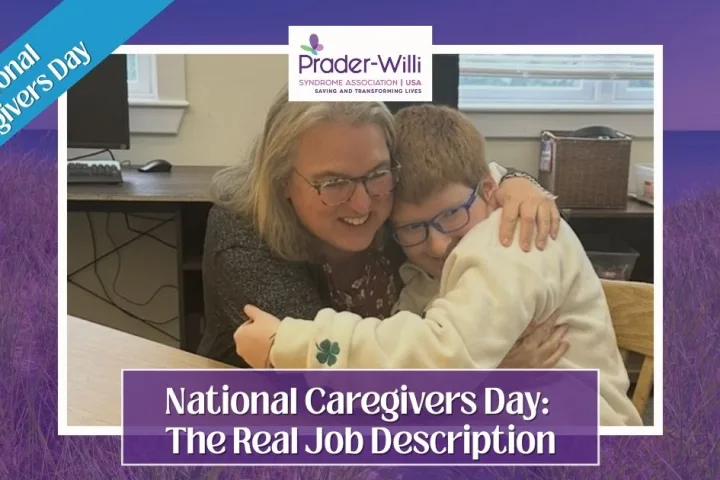You have heard exercise is good for physical health, but did you know research also shows exercise is beneficial to mental health and mood? According to the Mayo Clinic, physical activity stimulates endorphins in the brain that elevate mood and encourage relaxation.
Exercise can fend off depression and anxiety in individuals with PWS and can even combat unwanted behaviors like physical aggression, self-injury, and destruction of material goods.
- If an individual has general anxiety, 60 minutes of physical activity a day is often enough to help them feel better.
- Individuals with higher levels of anxiety might need more regular periods of exercise throughout the day to feel better.
- Individuals that tend to be more explosive and aggressive might respond to regularly scheduled activities like playing basketball or running to help with emotional regulation.
- Exercise in the form of fun physical activities can also be helpful in redirecting unwanted behavior such as skin picking. If your loved one is skin picking, engage him or her in a game of catch or other physical activity which requires the use of their hands.
- Individuals with PWS and Sensory Processing issues can also benefit from exercise to help regulate their systems and decrease unwanted behaviors. The exercise routine should be based on the individual’s need for sensory input. For example, if your loved one needs more physical input, like joint compression or heavy muscle work, using light weights, running, playing basketball, or performing wall pushups can help meet these needs. If your loved one needs more movement to help regulate, walking, rolling on a stability ball, or jumping on a trampoline may be more helpful.
How can you encourage someone with PWS to exercise?
- Do not call it exercise!!
- Make the activity fun.
- Do the activity with them.
- Make it part of the routine day.
- Use creative wording. Instead of, “It’s time for our walk,” try “Let us take a hike to look for birds!”
- Play tag, follow the leader, or engage in playful competition.
Exercise, while good for nearly everyone, can be a fun and interactive way to help individuals with PWS physically, mentally, emotionally, and behaviorally.





 Perry A. Zirkel has written more than 1,500 publications on various aspects of school law, with an emphasis on legal issues in special education. He writes a regular column for NAESP’s Principal magazine and NASP’s Communiqué newsletter, and he did so previously for Phi Delta Kappan and Teaching Exceptional Children.
Perry A. Zirkel has written more than 1,500 publications on various aspects of school law, with an emphasis on legal issues in special education. He writes a regular column for NAESP’s Principal magazine and NASP’s Communiqué newsletter, and he did so previously for Phi Delta Kappan and Teaching Exceptional Children. Jennifer Bolander has been serving as a Special Education Specialist for PWSA (USA) since October of 2015. She is a graduate of John Carroll University and lives in Ohio with her husband Brad and daughters Kate (17), and Sophia (13) who was born with PWS.
Jennifer Bolander has been serving as a Special Education Specialist for PWSA (USA) since October of 2015. She is a graduate of John Carroll University and lives in Ohio with her husband Brad and daughters Kate (17), and Sophia (13) who was born with PWS. Dr. Amy McTighe is the PWS Program Manager and Inpatient Teacher at the Center for Prader-Willi Syndrome at the Children’s Institute of Pittsburgh. She graduated from Duquesne University receiving her Bachelor’s and Master’s degree in Education with a focus on elementary education, special education, and language arts.
Dr. Amy McTighe is the PWS Program Manager and Inpatient Teacher at the Center for Prader-Willi Syndrome at the Children’s Institute of Pittsburgh. She graduated from Duquesne University receiving her Bachelor’s and Master’s degree in Education with a focus on elementary education, special education, and language arts. Evan has worked with the Prader-Willi Syndrome Association (USA) since 2007 primarily as a Crisis Intervention and Family Support Counselor. Evans works with parents and schools to foster strong collaborative relationships and appropriate educational environments for students with PWS.
Evan has worked with the Prader-Willi Syndrome Association (USA) since 2007 primarily as a Crisis Intervention and Family Support Counselor. Evans works with parents and schools to foster strong collaborative relationships and appropriate educational environments for students with PWS. Staci Zimmerman works for Prader-Willi Syndrome Association of Colorado as an Individualized Education Program (IEP) consultant. Staci collaborates with the PWS multi-disciplinary clinic at the Children’s Hospital in Denver supporting families and school districts around the United States with their child’s Individual Educational Plan.
Staci Zimmerman works for Prader-Willi Syndrome Association of Colorado as an Individualized Education Program (IEP) consultant. Staci collaborates with the PWS multi-disciplinary clinic at the Children’s Hospital in Denver supporting families and school districts around the United States with their child’s Individual Educational Plan. Founded in 2001, SDLC is a non-profit legal services organization dedicated to protecting and advancing the legal rights of people with disabilities throughout the South. It partners with the Southern Poverty Law Center, Protection and Advocacy (P&A) programs, Legal Services Corporations (LSC) and disability organizations on major, systemic disability rights issues involving the Individuals with Disabilities Education Act (IDEA), Americans with Disabilities Act (ADA), and the federal Medicaid Act. Recently in November 2014, Jim retired.
Founded in 2001, SDLC is a non-profit legal services organization dedicated to protecting and advancing the legal rights of people with disabilities throughout the South. It partners with the Southern Poverty Law Center, Protection and Advocacy (P&A) programs, Legal Services Corporations (LSC) and disability organizations on major, systemic disability rights issues involving the Individuals with Disabilities Education Act (IDEA), Americans with Disabilities Act (ADA), and the federal Medicaid Act. Recently in November 2014, Jim retired.